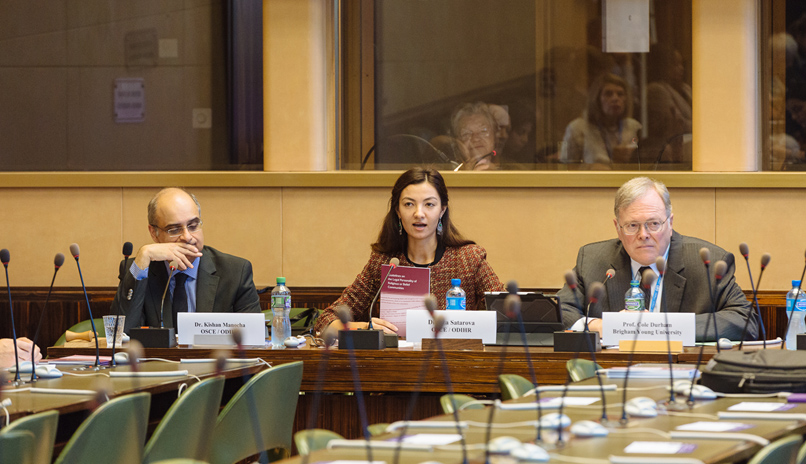Durham at UN Launch of the OSCE / ODIHR Guidelines on the Legal Personality of Religious or Belief Communities, Geneva 29 September 2017

[From reports by OSCE/ODIHR:] One of the most significant obstacles to full enjoyment of the right to freedom of religion or belief in practice is the inability for religious or belief communities to access legal personality within a national legal framework. To address this challenge facing many religious or belief communities across the OSCE region, the OSCE Office for Democratic Institutions and Human Rights (ODIHR) and the Venice Commission issued in 2015 Guidelines on the Legal Personality of Religious or Belief Communities.
The Guidelines were presented and discussed at the United Nations Office in Geneva on 29 September 2017 at a meeting attended by some 45 representatives of UN Member States, civil society and international organizations. The meeting was organized by ODIHR, in co-operation with the Polish Mission to the United Nations in Geneva, the ADF International advocacy group and the International Center for Law and Religion Studies at Brigham Young University, United States.
“Restrictions on the legal personality of religious or belief communities may not make headlines, but they have real-world effects that potentially touch on all aspects of a community’s functioning, jeopardizing its vitality and visibility,” said Kishan Manocha, ODIHR Senior Adviser on Freedom of Religion or Belief, who moderated the meeting.
Speakers at the event stressed that the right to acquire a legal personality is an integral part of freedom of religion or belief and highlighted the importance of this issue for both religious or belief communities themselves and the wider society.
“The European Court of Human Rights has been abundantly clear on this point. Not only has it found that the right to autonomous existence is at the very heart of the protections guaranteed under Article 9 of the European Convention on Human Rights, but it has gone as far as saying that it is indispensable for pluralism in a democratic society,” said Laurence Wilkinson, Legal Counsel for ADF International.
Mine Yildirim, researcher and founder of the Freedom of Belief Initiative, pointed out that “while the lack of legal personality can be understood in light of historical developments, obligations under international human rights law require states to take necessary steps to provide religious or belief communities with the opportunity to acquire and maintain an adequate form of legal personality.”
The joint Guidelines are a product of extensive consultations with government officials and civil society representatives from various parts of the OSCE region and are currently available in English, Russian, Tajik, Turkish and Ukrainian.
Photo caption: Dilnoza Satarova, Associate Officer on Freedom of Religion or Belief at the OSCE Office for Democratic Institutions and Human Rights (ODIHR), presents the OSCE/ODIHR-Venice Commission Guidelines on the Legal Personality of Religious or Belief Communities at an event co-organized by ODIHR at the UN Office in Geneva on 29 September 2017. To her right is Kishan Manocha, ODIHR Senior Adviser on Freedom of Religion or Belief; to her left, Prof. Cole Durham of the Brigham Young University, United States. 29 September 2017.